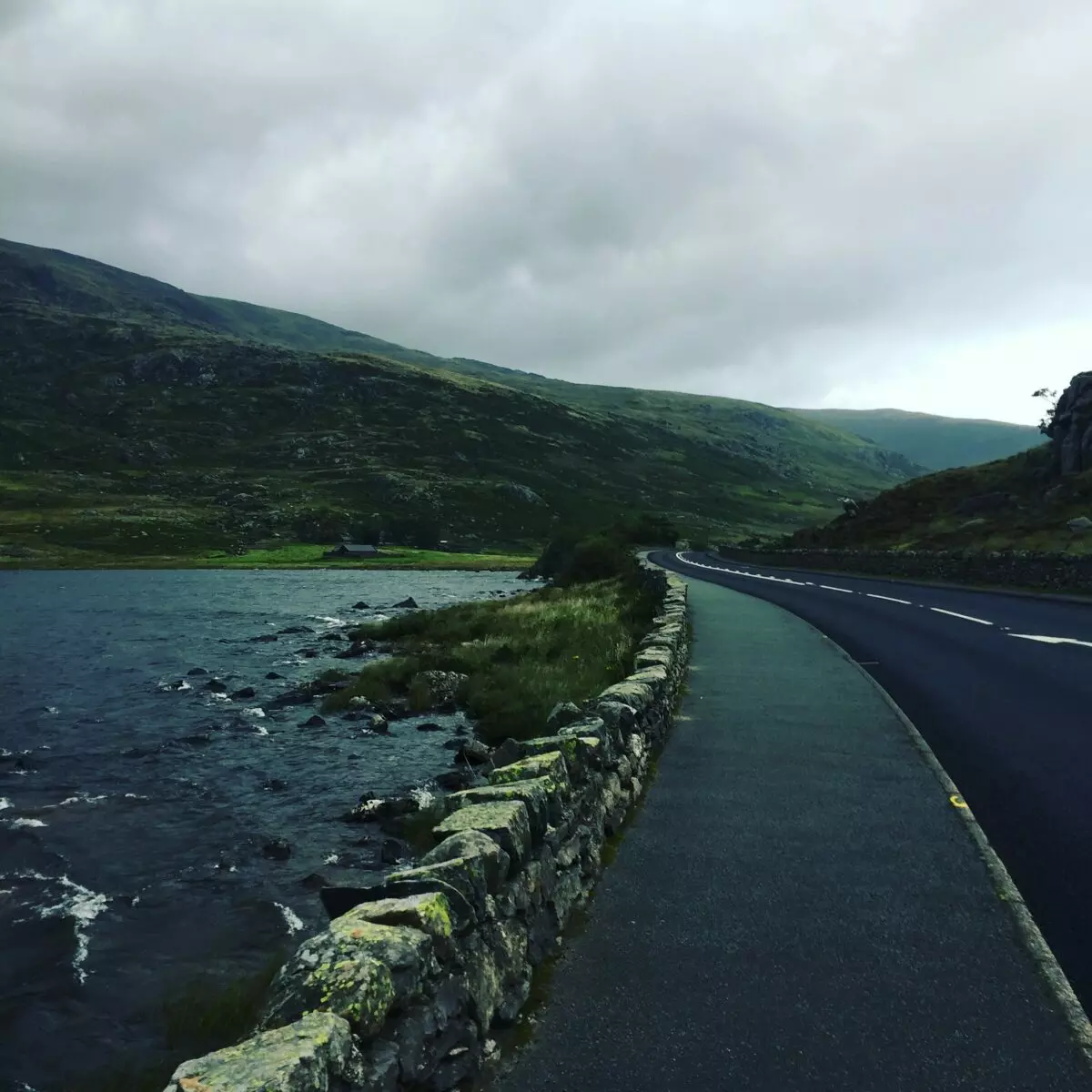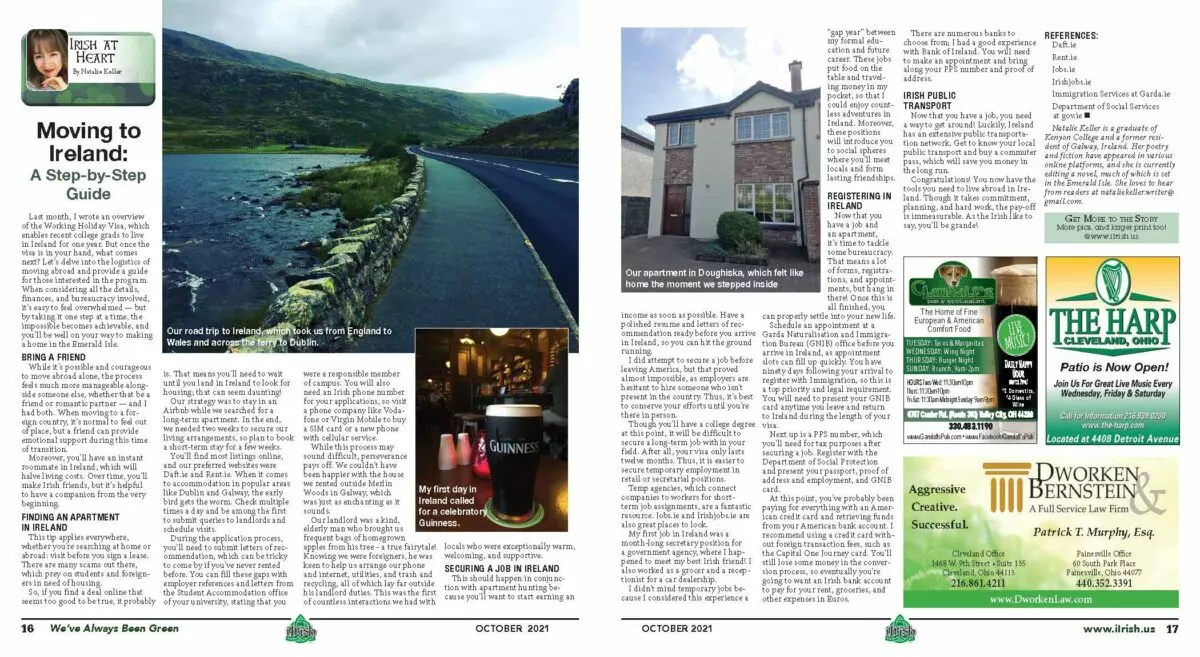
Irish at Heart: Moving to Ireland: A Step-by-Step Guide
By Natalie Keller
Last month, I wrote an overview of the Working Holiday Visa, which enables recent college grads to live in Ireland for one year. But once the visa is in your hand, what comes next? Let’s delve into the logistics of moving abroad and provide a guide for those interested in the program. When considering all the details, finances, and bureaucracy involved, it’s easy to feel overwhelmed — but by taking it one step at a time, the impossible becomes achievable, and you’ll be well on your way to making a home in the Emerald Isle.
Bring a Friend
While it’s possible and courageous to move abroad alone, the process feels much more manageable alongside someone else, whether that be a friend or romantic partner — and I had both. When moving to a foreign country, it’s normal to feel out of place, but a friend can provide emotional support during this time of transition.
Moreover, you’ll have an instant roommate in Ireland, which will halve living costs. Over time, you’ll make Irish friends, but it’s helpful to have a companion from the very beginning.

Finding an Apartment in Ireland
This tip applies everywhere, whether you’re searching at home or abroad: visit before you sign a lease. There are many scams out there, that prey on students and foreigners in need of housing.
So, if you find a deal online that seems too good to be true, it probably is. That means you’ll need to wait until you land in Ireland to look for housing; that can seem daunting!
Our strategy was to stay in an Airbnb while we searched for a long-term apartment. In the end, we needed two weeks to secure our living arrangements, so plan to book a short-term stay for a few weeks.
You’ll find most listings online, and our preferred websites were Daft.ie and Rent.ie. When it comes to accommodation in popular areas like Dublin and Galway, the early bird gets the worm. Check multiple times a day and be among the first to submit queries to landlords and schedule visits.
During the application process, you’ll need to submit letters of recommendation, which can be tricky to come by if you’ve never rented before. You can fill these gaps with employer references and letters from the Student Accommodation office of your university, stating that you were a responsible member of campus.
You will also need an Irish phone number for your applications, so visit a phone company like Vodafone or Virgin Mobile to buy a SIM card or a new phone with cellular service.
While this process may sound difficult, perseverance pays off. We couldn’t have been happier with the house we rented outside Merlin Woods in Galway, which was just as enchanting as it sounds.

Our landlord was a kind, elderly man who brought us frequent bags of homegrown apples from his tree – a true fairytale! Knowing we were foreigners, he was keen to help us arrange our phone and internet, utilities, and trash and recycling, all of which lay far outside his landlord duties. This was the first of countless interactions we had with locals who were exceptionally warm, welcoming, and supportive.
Securing a Job in Ireland
This should happen in conjunction with apartment hunting because you’ll want to start earning an income as soon as possible. Have a polished resume and letters of recommendation ready before you arrive in Ireland, so you can hit the ground running.
I did attempt to secure a job before leaving America, but that proved almost impossible, as employers are hesitant to hire someone who isn’t present in the country. Thus, it’s best to conserve your efforts until you’re there in person.
Though you’ll have a college degree at this point, it will be difficult to secure a long-term job within your field. After all, your visa only lasts twelve months. Thus, it is easier to secure temporary employment in retail or secretarial positions.
Temp agencies, which connect companies to workers for short-term job assignments, are a fantastic resource. Jobs.ie and Irishjobs.ie are also great places to look.
My first job in Ireland was a month-long secretary position for a government agency, where I happened to meet my best Irish friend! I also worked as a grocer and a receptionist for a car dealership.
I didn’t mind temporary jobs because I considered this experience a “gap year” between my formal education and future career. These jobs put food on the table and traveling money in my pocket so that I could enjoy countless adventures in Ireland. Moreover, these positions will introduce you to social spheres where you’ll meet locals and form lasting friendships.
Registering in Ireland
Now that you have a job and an apartment, it’s time to tackle some bureaucracy. That means a lot of forms, registrations, and appointments, but hang in there! Once this is all finished, you can properly settle into your new life.
Schedule an appointment at a Garda Naturalisation and Immigration Bureau (GNIB) office before you arrive in Ireland, as appointment slots can fill up quickly. You have ninety days following your arrival to register with Immigration, so this is a top priority and legal requirement. You will need to present your GNIB card anytime you leave and return to Ireland during the length of your visa.
Next up is a PPS number, which you’ll need for tax purposes after securing a job. Register with the Department of Social Protection and present your passport, proof of address and employment, and GNIB card.
At this point, you’ve probably been paying for everything with an American credit card and retrieving funds from your American bank account. I recommend using a credit card without foreign transaction fees, such as the Capital One Journey card. You’ll still lose some money in the conversion process, so eventually you’re going to want an Irish bank account to pay for your rent, groceries, and other expenses in Euros.
There are numerous banks to choose from; I had a good experience with Bank of Ireland. You will need to make an appointment and bring along your PPS number and proof of address.
Irish Public Transport
Now that you have a job, you need a way to get around! Luckily, Ireland has an extensive public transportation network. Get to know your local public transport and buy a commuter pass, which will save you money in the long run.

Congratulations! You now have the tools you need to live abroad in Ireland. Though it takes commitment, planning, and hard work, the payoff is immeasurable. As the Irish like to say, you’ll be grande!
References:
Daft.ie
Rent.ie
Jobs.ie
Irishjobs.ie
Immigration Services at Garda.ie
Department of Social Services at gov.ie
*Natalie Keller is a graduate of Kenyon College and a former resident of Galway, Ireland. Her poetry and fiction have appeared in various online platforms, and she is currently editing a novel, much of which is set in the Emerald Isle. She loves to hear from readers at [email protected].





